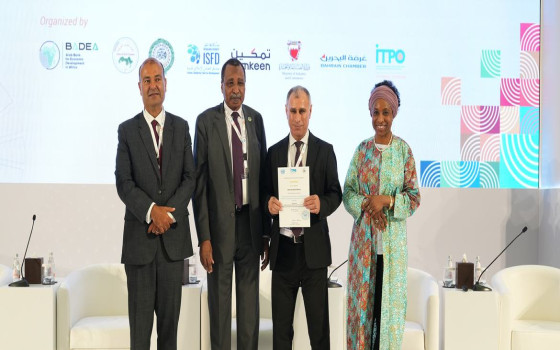
Secretary-General of the Union of Arab Chambers: Youth are capable of achieving miracles and the future of the region lies in unleashing their energies.. The private sector contributes 75% of the gross domestic product

- Europe and Arabs
- Monday , 14 October 2024 10:40 AM GMT
New York: Europe and the Arabs
Dr. Khaled Hanafy, Secretary-General of the Union of Arab Chambers, said that the Arab private sector contributes 75% of the gross domestic product and is a major driver of development and employment in the region, pointing to the role of the Union in addressing many pressing issues such as combating poverty and empowering women. According to the United Nations daily news bulletin, a copy of which we received.
The General Union of Arab Chambers, according to Dr. Khaled Hanafy, is an organization founded by the Arab private sector in 1951, "in recognition by the Arabs at that time that the private sector has a very important role in production, development and employment."
The Union represents the private sector in all 22 Arab countries, and works to formulate laws and agreements related to the economy and investment. The Union seeks to connect the Arab business community and strengthen relations with its counterparts globally, which influences government decisions related to trade. The Union also includes joint chambers in countries such as the United States and Europe, which facilitates access to markets and enhances cooperation.
While at the UN headquarters to participate in events related to sustainable development, Dr. Khaled Hanafy said in an interview with UN News: “We hope that through trade, economy and business, the Arab private sector can achieve what cannot be achieved by other parties because we believe that agreements concluded by countries may not be achieved on the ground.”
Sustainable Development Goals
Dr. Khaled Hanafy explained that the union contributes effectively to achieving the sustainable development goals by focusing on various economic sectors such as the green economy, the orange (creative) economy, the circular economy, combating poverty, empowering women, achieving gender equality and involving youth in protecting the environment.
He said that the topics addressed by the union “touch at the heart of the sustainable development goals.” For example, with regard to eliminating hunger, the Arab private sector and Arab entrepreneurs have many initiatives to deal with smart agriculture such as using water in a rational manner, which ultimately contributes to addressing the problem of food security, which is essentially linked to hunger.
Supporting Entrepreneurship
The Federation of Arab Chambers works to support entrepreneurship by providing partnerships between business leaders and owners of initiatives and small projects, which contributes to achieving sustainable development.
In this regard, Dr. Hanfy referred to the Living Independently initiative, which aims to empower people with disabilities by accommodating their projects and ideas. The second edition of this initiative was held as part of the activities of the Global Entrepreneurship and Investment Forum organized by the Investment and Technology Promotion Office of the United Nations Industrial Development Organization (UNIDO) in Bahrain last May.
Dr. Hanfy referred to another initiative called “Let’s Get to Know One another”, which facilitates acquaintance between parties in different places, especially in the Arab region, so that they can get to know their counterparts in other countries through projects and heritage.
The Federation’s role in addressing unemployment
Dr. Khaled Hanfy also highlighted the Federation’s contribution to addressing the problem of unemployment in the Arab region, especially among young people, by encouraging entrepreneurship and small and medium enterprises that absorb the energies of young people and contribute to reducing poverty.
Hanfy touched on what he described as structural unemployment, which occurs as a result of "the imbalance between supply and demand in the labor market. Most of the unemployed are educated." There is also another type of unemployment known as disguised unemployment, where individuals work in jobs that do not match their skills and capabilities. The third type of unemployment is utilitarian unemployment, "where you often find that there are those who are qualified, able to work, willing to work, and working, but are not in a state of disguised unemployment, but they work at a significantly lower level than their capacity and capabilities - that is, they perform simple work that does not match what they are able to provide." Dr. Khaled Hanfy continued by saying: "Unemployment in the Arab region is called better unemployment because unemployment in the Arab region, unfortunately, is concentrated in the youth category, and youth are better than the elderly as a labor force, and also among the youth, the most unemployed are the educated." He pointed out that addressing these types of unemployment requires enhancing innovation and creativity in projects, which enables individuals to achieve higher productivity. He said that the private sector, especially small and medium enterprises, provides an effective solution to address these challenges, as entrepreneurship contributes to providing new job opportunities that meet market needs.
A message to Arab youth
Dr. Khaled Hanafi praised the creativity of Arab youth, calling for belief in their ability to change. He continued by saying:
"Youth are capable of achieving miracles and changing the unsatisfactory reality in many Arab countries, and therefore my message is not to youth, but to those who deal with youth: We must believe that youth are capable of change. We now live in a different era and Arab youth are capable of communicating with the whole world and accessing knowledge and information. Unleash the energies of youth in a big way and many pleasant surprises will occur. Through our experience with these youth in entrepreneurship projects and entrepreneurship-related competitions, we discovered many things that we did not expect to exist."












No Comments Found